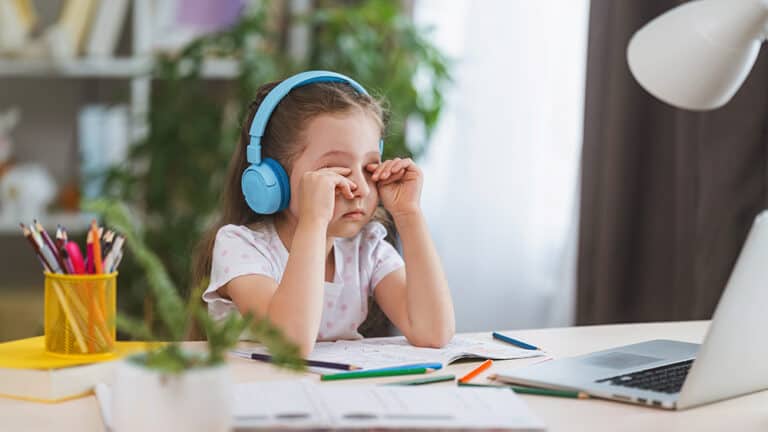Back-to-school anxiety is common and understandable. Many kids may feel anxious about returning to school after a long summer break. Others may feel nervous about beginning school for the first time.
Regardless of the reason, parents can make the transition easier by identifying the symptoms of stress and anxiety and implementing some creative strategies.
A few reasons why they might be anxious
Some kid’s worries are rooted in not knowing what to expect, especially if they’ll be in a new building, school, or district. They may also worry about making new friends or have concerns about whether or not they’ll be able to handle the workload.
Covid related concerns
For students who spend months doing online learning due to the pandemic, going back to school can feel that much more intimidating and scary. This might be especially true if they had classes online for the entirety of the 2020 school year.
They might be worried about anything from having to wear masks, being unvaccinated to worrying about if they’ll still have the same friends after being out of school for so long.
Other concerns
Sometimes, kids are worried and anxious about the upcoming school year due to their experiences with bullies. For many, this time away from school brought a sigh of relief from mean behavior. And with the new school year approaching, they may start to worry that they’ll have to go through the same experiences again.
There are many reasons why kids may experience anxiety and stress as the first day of school approaches.
How to identify anxiety in your child
While anxiety regarding returning to school is expected and common to experience, it’s also something that shouldn’t be ignored. For this reason, you need to identify when your kids are grappling with stress and anxiety.
Signs of anxiety
When kids are anxious, they may not always know how to put their feelings into words. Instead, watch for signs in their behavior. Kids who are experiencing anxiety may:
- Appear more clingy than usual
- Be restless and fidgety
- Complain of stomach aches
- Display changes in their sleeping and eating habits
- Express negative thoughts and worries
- Be more irritable, or get upset or angry more quickly
- Have episodes of unexplained crying
- Struggle to focus and concentrate
If your child’s anxiety lasts longer than a couple of weeks and starts to interfere with their day-to-day life, it may be a sign of an anxiety disorder. It’s essential to talk to a mental health professional about your concerns.
Untreated anxiety puts your child at risk for poor school performance, trouble maintaining friendships, and even symptoms of depression.
Tips for managing stress and anxiety
The best way to address anxiety is often to encourage them to talk to you about what’s going on. Listen to them without judging them, and validate their emotions. Sometimes expressing their feelings is all they need to feel at ease.
Another great way to ease some of their anxiety about going back to school is to get your home ready for the upcoming transition. Strategies like planning their school lunches ahead of time or establishing a homework spacer can help them feel more in control and relieve some of their anxiety.
Assure them they’re not alone.
Remind your child that they’re not the only ones who may be feeling anxious or nervous about starting school again. Other students are just as likely to feel anxious about the first day of school. Reassure them too that the teacher knows that kids will feel nervous and will probably spend some time helping students get comfortable as the new school year begins.
Keep in mind that living through a pandemic may have strengthened feelings of isolation and loneliness in kids—significantly if they have been cut off from many of their peers since the start of the pandemic.
The bottom line
When kids feel stressed or anxious about the upcoming school year, the key to supporting them is there for them when they need you to be. Listen to what they have to say without minimizing their concerns or trying to fix the situation for them. Allow them to process their feelings without judgment.
Sometimes, just having someone understand what they’re experiencing is enough to help kids get through a stressful situation. Other times, they need additional help. In these situations, consider contacting us.
The outstanding team at Abbey Neuropsychology Clinic in Palo Alto, California, has extensive experience evaluating anxiety and designing personalized treatment plans using the most advanced therapeutic techniques to address anxiety symptoms and related conditions. If you have questions about anxiety disorders, assessment tools, or treatment options, or you’d like to schedule an appointment, call the office today.
The clinic is now offering telehealth to clients in Palo Alto, Los Altos, Los Altos Hills, Woodside, Menlo Park, Atherton, Napa, Orinda, Hillsborough, Belvedere Tiburon, Blackhawk, Noe Valley, Malibu, Beverly Hills, and La Jolla.
Sources
https://www.mayoclinic.org/diseases-conditions/anxiety/symptoms-causes/syc-20350961






